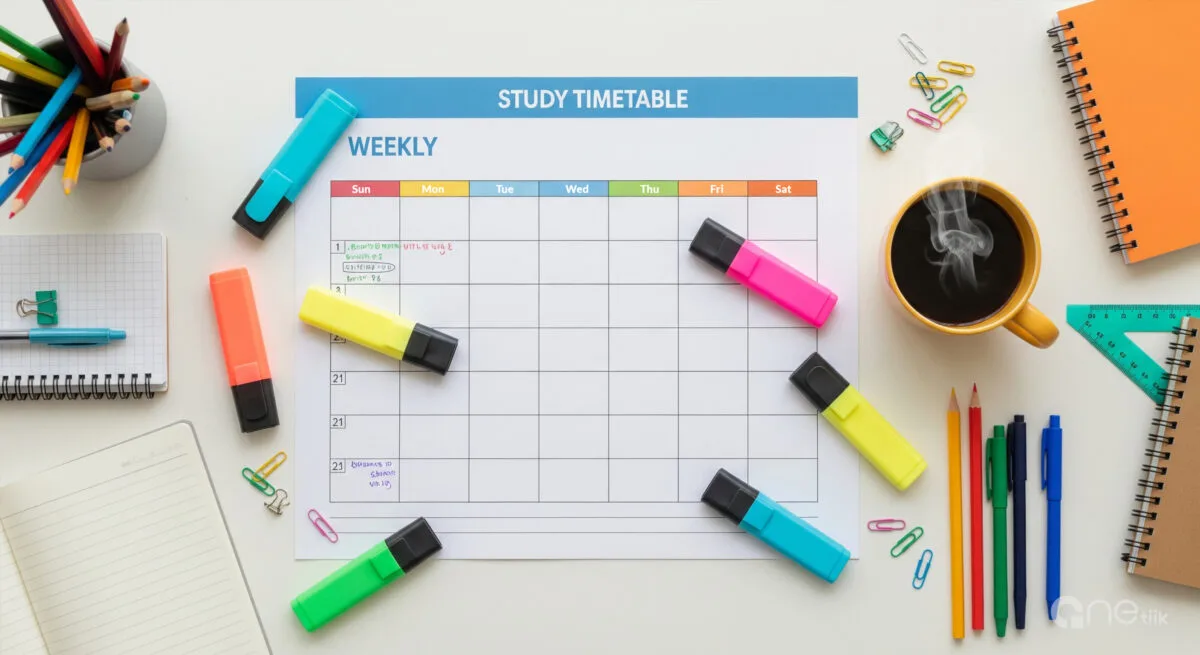Are you tired of feeling overwhelmed by studies? Do you keep promising yourself you’ll “start tomorrow” but struggle to stay consistent? You’re not alone. Every student, whether in Class 8 or preparing for competitive exams like NEET, needs one secret weapon: a well-structured study timetable.
This guide will walk you through creating the best study timetable for your needs, whether you’re in school, college, or a drop year student. We’ll also explore how AI and human behavior impact learning routines and help you stay ahead in this fast-paced world.
Why a Good Study Time Table Matters

Imagine starting each day knowing exactly what you need to study and when. That’s the power of a timetable. It reduces stress, improves focus, and boosts your performance. However, in the age of AI-driven tools and distractions, having a plan is more crucial than ever.
How AI is Changing Study Habits
Artificial intelligence is now embedded in education through:
- Smart reminders from apps like Notion, TickTick, or Study Bunny
- Adaptive learning tools (like Khan Academy or BYJU’S)
- Study pattern analysis (e.g., Pomodoro AI timers)
- Personalized learning journeys via AI-based tutors
But AI is a tool, not a substitute for planning. You still need discipline, and that’s where a well-set routine shines.
👉 Unlock the 3 Secret Study Tips
How to Create the Best Study Time Table
Here’s a simple, step-by-step process to build your personalized study timetable:
| Step | Task |
|---|---|
| 1. | Identify your peak hours (morning/night person?) |
| 2. | Block fixed times for school/college/coaching |
| 3. | Add 2-3 slots for focused study (1-2 hours each) |
| 4. | Include revision time daily |
| 5. | Take regular short breaks |
| 6. | Set weekly targets and review every Sunday |
| 7. | Keep it flexible for unexpected events |
General Time Table for All Students
This timetable is suitable for most school or college students, assuming a wake-up time of 6:00 a.m.
| Time | Activity |
|---|---|
| 6:00 AM | Wake up + freshen up |
| 6:30 AM – 7:30 | Light exercise + breakfast |
| 7:30 – 8:30 | Revision of previous topics |
| 9:00 – 1:00 | School / College time |
| 1:00 – 2:00 | Lunch + Rest |
| 2:00 – 4:00 | Study session 1 (New topics) |
| 4:00 – 5:00 | Break / Hobby time |
| 5:00 – 6:30 | Study session 2 (Practice) |
| 6:30 – 8:00 | Dinner + family time |
| 8:00 – 9:00 | Study session 3 (Revision) |
| 9:00 – 10:00 | Relax + sleep preparation |
Best Study Time Table for Competitive Exams
For exams like UPSC, NEET, JEE, etc., the stakes are higher. Here’s an ideal timetable for aspirants:
| Time | Task |
|---|---|
| 5:00 AM | Wake up & yoga/meditation |
| 6:00 – 8:00 | Study session (core subject) |
| 8:00 – 9:00 | Breakfast + break |
| 9:00 – 12:00 | Study session (mock tests) |
| 12:00 – 1:00 | Lunch |
| 1:00 – 3:00 | Study session (weak areas) |
| 3:00 – 4:00 | Break/nap |
| 4:00 – 6:00 | Study session (practice Qs) |
| 6:00 – 7:00 | Walk/refresh |
| 7:00 – 9:00 | Revision + current affairs |
| 10:00 PM | Sleep |
👉 Tip: Use AI apps like Anki (spaced repetition) and ChatGPT (for concept clarity).
Class-Wise Best Study Time Tables
Let’s now go class by class:
Best Study Time Table for Class 8
| Time | Subject/Task |
|---|---|
| 6:00 AM | Wake up + revise notes |
| 7:00 AM | School prep |
| 8:00 – 2:00 | School |
| 3:00 PM | Rest + snacks |
| 4:00 PM | Science / Maths |
| 5:00 PM | Break / Games |
| 6:00 PM | English / Hindi |
| 8:00 PM | Light revision |
Best Study Time Table for Class 9
Class 9 is a foundation year for board classes.
| Time | Subject/Task |
|---|---|
| 6:00 AM | Wake up + Science |
| 8:00 – 2:00 | School |
| 3:00 PM | Lunch + short nap |
| 4:00 PM | Maths / SST |
| 6:00 PM | Break / Refresh |
| 7:00 PM | English + Revision |
Best Study Time Table for Class 10
Board year! Focus on previous year papers and concept clarity.
| Time | Task |
|---|---|
| 5:30 AM | Wake up + light revision |
| 8:00 – 2:00 | School |
| 3:00 PM | Subject 1 (e.g., Science) |
| 5:00 PM | Practice + Break |
| 6:30 PM | Subject 2 (e.g., SST) |
| 8:00 PM | Revision + MCQs |
Best Study Time Table for Class 11 (Science)
Focus on NEET/JEE base topics. Include physics-numerical practice.
| Time | Task |
|---|---|
| 5:00 AM | Wake up + Physics Numericals |
| 8-2 PM | School |
| 3-4 PM | Chemistry theory |
| 4-5 PM | Math practice |
| 7-9 PM | Biology + Revision |
Best Study Time Table for Class 12 (Science)
Final board year + entrance prep.
| Time | Task |
|---|---|
| 5:00 AM | Biology + Notes |
| 8-2 PM | School / Coaching |
| 3-5 PM | Chemistry + NCERT |
| 6-8 PM | Physics practice |
| 9-10 PM | Revision (MCQ + PYQs) |
Best Study Time Table for Class 12 (Commerce)
Balance theory + numerical. Practice accounts daily.
| Time | Task |
|---|---|
| 6:00 AM | Accountancy |
| 8-2 PM | School |
| 3-4 PM | Economics |
| 4-5 PM | Break / Walk |
| 6-7 PM | Business Studies + Revision |
Best Study Time Table for NEET Droppers
This is a golden year. Treat it like a job.
| Time | Activity |
|---|---|
| 5:00 AM | Wake up + Meditation |
| 6:00 – 8:00 | Physics |
| 9:00 – 11:00 | Biology |
| 12:00 – 1:00 | Chemistry + NCERT |
| 2:00 – 4:00 | Mock Test / PYQs |
| 5:00 – 6:00 | Doubts + Revision |
| 7:00 – 9:00 | AI tools + Daily Test |
🔍 Tip: Track study hours using apps like Forest or StudyWithMe AI Pomodoro tools.
Tips to Stick to Your Study Time Table
- Start small: Follow it for just 3 days, then extend.
- Use a physical planner or Google Calendar
- Reward yourself: Chocolate, game time, or 10-minute Instagram after study
- Avoid multitasking
- Don’t compare with others. Stick to YOUR routine.
Full Weekly Study Time Table
| Day | Morning | Afternoon | Evening |
|---|---|---|---|
| Monday | Science | Math + Revision | Hindi + Reading |
| Tuesday | SST | Physics + PYQ | Grammar Practice |
| Wednesday | Biology | Math Practice | Literature |
| Thursday | Physics | Mock Tests | SST + Current |
| Friday | Chemistry | English Grammar | Revision |
| Saturday | Weak Subjects | Weekly Tests | Light Study |
| Sunday | Rest + Planning | Motivation video | Prepare Next Week |
Conclusion
A perfect study timetable is not about perfection; it’s about consistency. No matter your class or goal, if you plan your day, stay focused, and use smart tools (including AI), you’ll see amazing results.
Start now. Build your routine. Stick to it for just 7 days and you’ll feel the difference!
Also, Check 👉 How To Be Good In Studies: 10 Proven Learning Tricks.
FAQs
What is the best time to study?
Early morning (4 AM – 6 AM) is best for focus. Late night works for some too—choose what suits you.
How many hours should I study daily?
For school students: 4–6 hrs.
For competitive exams: 8–10 hrs (with breaks).
How can I stick to a study timetable?
Make it realistic. Track it. Use reminders and reward systems.
Can AI help in study planning?
Yes! Apps like Notion, Google Calendar, Study Bunny, and Anki use AI to assist time management and revision.
Should I include hobbies and breaks?
Absolutely! Balance is key to long-term success.





















